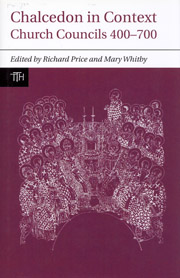Book contents
- Frontmatter
- Contents
- Abbreviations
- List of Contributors
- Introduction
- The Council of Chalcedon and the Definition of Christian Tradition
- ‘Reading’ the First Council of Ephesus (431)
- The Syriac Acts of the Second Council of Ephesus (449)
- The Council of Chalcedon (451): A Narrative
- Truth, Omission, and Fiction in the Acts of Chalcedon
- Why Did the Syrians reject the Council of Chalcedon?
- The Second Council of Constantinople (553) and the Malleable Past
- The Lateran Council of 649 as an Ecumenical Council
- The Quinisext Council (692) as a Continuation of Chalcedon
- Acclamations at the Council of Chalcedon
- An Unholy Crew? Bishops Behaving Badly at Church Councils
- Index
The Syriac Acts of the Second Council of Ephesus (449)
- Frontmatter
- Contents
- Abbreviations
- List of Contributors
- Introduction
- The Council of Chalcedon and the Definition of Christian Tradition
- ‘Reading’ the First Council of Ephesus (431)
- The Syriac Acts of the Second Council of Ephesus (449)
- The Council of Chalcedon (451): A Narrative
- Truth, Omission, and Fiction in the Acts of Chalcedon
- Why Did the Syrians reject the Council of Chalcedon?
- The Second Council of Constantinople (553) and the Malleable Past
- The Lateran Council of 649 as an Ecumenical Council
- The Quinisext Council (692) as a Continuation of Chalcedon
- Acclamations at the Council of Chalcedon
- An Unholy Crew? Bishops Behaving Badly at Church Councils
- Index
Summary
Introduction
The Second Council of Ephesus and the Council of Chalcedon, called two years later, are inextricably linked, by their historical context, in their theological conclusions (in that the one was called with the deliberate intention of annulling measures taken at the other, and of having a new definition of faith adopted), and in the manuscript tradition through which the record of most of their proceedings is preserved. The Council of Ephesus, called by Theodosius II when, as it turned out by accident, his reign had little more than a year to run, represented an emphatic victory for the ‘miaphysite’ (one-nature) tendency in the Greek Church. The presidency was given to Dioscorus, bishop of Alexandria; Theodoret, as the most prominent remaining proponent of a ‘dyophysite’ (two-nature) Christology not in exile, was excluded; and the first session, held on 8 August 449, rehearsed in immense detail the record of proceedings against the extreme-miaphysite archimandrite Eutyches in the autumn of 448, and of hearings called to hear disputes over that record earlier in 449, before absolving Eutyches, and declaring the deposition of Flavian, bishop of Constantinople.
It is the quotation in the acts of the first session at Chalcedon, called by the new emperor Marcian, of this part of the proceedings, incorporating verbatim re-quotations of the records of the hearings held between autumn 448 and spring 449, that preserves for us the record in Greek of the first session at Ephesus, ending with the written affirmations (‘subscriptions’ – ὑπογραφαί) of 140 participants.
- Type
- Chapter
- Information
- Chalcedon in ContextChurch Councils 400-700, pp. 45 - 69Publisher: Liverpool University PressPrint publication year: 2011



